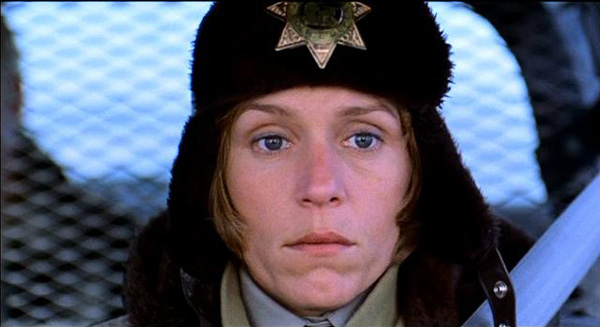Will ‘Holland, Michigan’ be fed into the ‘Fargo’ wood chipper?

Casablanca. Elizabethtown. Grosse Pointe. Towns whose names invoke immediate association with eponymous movies. There’s a sort of exoticism about these places, an inability to distinguish our knowledge of the place from the Hollywood representation.
Of no place is this likely more true that Fargo, N.D. The name immediately conjures up images from the Coen brothers’ film, replete with associations of bland politeness, bumbling criminal incompetence and bloody wood chippers.
But one man’s entertainment fodder is another man’s home. In the main, most people don’t like their places stereotyped, their native characteristics made fun of, their ways of life sneered at, or their cherished traditions and practices ridiculed – even if, as in the case of the Coen brothers, it’s done by natives with hyper-ironic cleverness. It’s never done with affection – especially by interlopers with a profit motive and no respect for local folkways. Indeed, it appears that many of the residents of Fargo were none too happy with the film’s portrayal of them.
So it was with no small amount of trepidation that I learned that last year’s top film on Hollywood’s vaunted “black list” of the best unproduced screenplays was entitled “Holland, Michigan.” It wouldn’t be unproduced for long, however; Errol Morris will direct, and it will star Bryan Cranston. To be fair, my many efforts to find and read the script came up short, so I speak only on the basis of synopses by those who have, as well as general judgments.
The story, taking place during Holland’s annual Tulip Time, involves a woman who suspects her husband of serial adultery, only to discover instead he’s a serial killer. In short, the synopses indicate yet another example of Hollywood’s fascination with violence and the darker aspects of life. Even if the movie has redemptive features, its apparent fascination with ugliness ought to make decent people pause.
If you want to understand a society, begin by looking at the stories it tells to and about itself, and then consider seriously the reflexive effects of those stories upon the culture. Libertarian writers have long criticized Plato for suggesting in The Republic that the poets be evicted from Athens, thus creating a “closed society.” But they neglect his actual point: the most powerful persons in any society are those who shape the imagination. Cultivating a virtuous citizenry requires attention to whom is telling the stories, and persons of intemperate character can never be free.
The film industry has become America’s foremost storyteller, and it has successfully wrapped itself in the First Amendment as a way of shielding itself against criticism. The Second Amendment cannot be used as an absolute claim to possess any firearm, and neither can the First be used to defend the explication of any vision of reality. Democracy, as Justice Robert H. Jackson said in his dissent in Terminiello v. Chicago, is not a suicide pact.
The shootings in Sandy Hook, Columbine, Virginia Tech, the Aurora theater and so forth ought to at least create concern that the endless glorification of violence to which two generations of Americans have been subjected has seriously polluted the fragile cultural ecosystem we all inhabit. The gun manufacturers and retailers ought not to be given a waiver in the wake of these events, but neither ought those who perpetuate a world where violence is seen as the solution to our problems, and where the noble and good is passed aside in favor of the base and ugly. Simply sitting through the previews in a movie theater is to be bombarded with twisted images of sadism.
Perhaps it can be argued that Hollywood is only responding to market forces, that as long as the public has an appetite for violence, Hollywood will keep feeding it. But that is hardly appealing to the better angels of our nature, and is in any instance an abrogation of the responsibility of a storyteller: to tell stories in such a way that they not only make sense of our world, but create meaning pertaining to our journey through it.
So count me among the nervous Hollanders who worry about Hollywood pumping its sewage into our fair city. I cringe at the thought, like a Fargo native talking about wood chippers, of having to explain to non-natives that Holland is nothing like its representation in the film. I blanch when I think of all the ham-fisted ways in which we will be mocked. I pray that our civic leaders don’t sell our reputations, and our souls, for tainted dollars. Hey Hollywood: leave us the hell alone.
See what new members are saying about why they donated to Bridge Michigan:
- “In order for this information to be accurate and unbiased it must be underwritten by its readers, not by special interests.” - Larry S.
- “Not many other media sources report on the topics Bridge does.” - Susan B.
- “Your journalism is outstanding and rare these days.” - Mark S.
If you want to ensure the future of nonpartisan, nonprofit Michigan journalism, please become a member today. You, too, will be asked why you donated and maybe we'll feature your quote next time!
 Will Hollywood do to Holland what it did to Fargo? The possibility certainly exists, and for what? A little bit of money. There’s more to life than a little money, y’know.
Will Hollywood do to Holland what it did to Fargo? The possibility certainly exists, and for what? A little bit of money. There’s more to life than a little money, y’know.